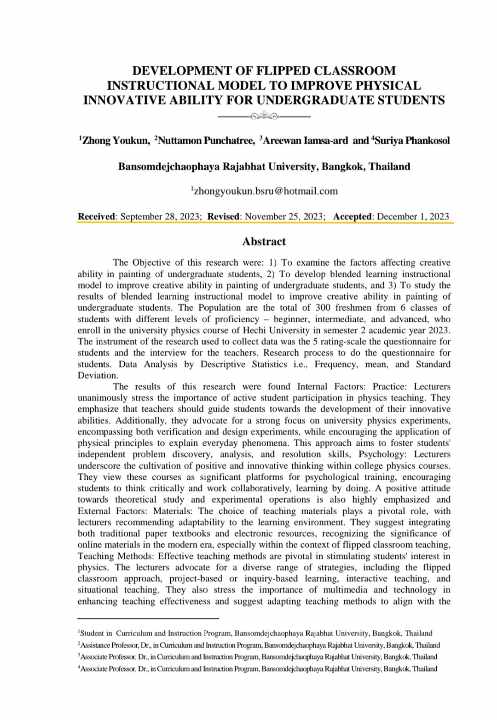Abstract
The Objective of this research were: 1) To examine the factors affecting creative ability in painting of undergraduate students, 2) To develop blended learning instructional model to improve creative ability in painting of undergraduate students, and 3) To study the results of blended learning instructional model to improve creative ability in painting of undergraduate students. The Population are the total of 300 freshmen from 6 classes of
students with different levels of proficiency – beginner, intermediate, and advanced, who enroll in the university physics course of Hechi University in semester 2 academic year 2023. The instrument of the research used to collect data was the 5 rating-scale the questionnaire for students and the interview for the teachers. Research process to do the questionnaire for students. Data Analysis by Descriptive Statistics i.e., Frequency, mean, and Standard Deviation. The results of this research were found Internal Factors: Practice: Lecturers unanimously stress the importance of active student participation in physics teaching. They emphasize that teachers should guide students towards the development of their innovative abilities. Additionally, they advocate for a strong focus on university physics experiments, encompassing both verification and design experiments, while encouraging the application of physical principles to explain everyday phenomena. This approach aims to foster students’
independent problem discovery, analysis, and resolution skills, Psychology: Lecturers underscore the cultivation of positive and innovative thinking within college physics courses. They view these courses as significant platforms for psychological training, encouraging students to think critically and work collaboratively, learning by doing. A positive attitude towards theoretical study and experimental operations is also highly emphasized and
External Factors: Materials: The choice of teaching materials plays a pivotal role, with lecturers recommending adaptability to the learning environment. They suggest integrating both traditional paper textbooks and electronic resources, recognizing the significance of online materials in the modern era, especially within the context of flipped classroom teaching, Teaching Methods: Effective teaching methods are pivotal in stimulating students’ interest in physics. The lecturers advocate for a diverse range of strategies, including the flipped classroom approach, project-based or inquiry-based learning, interactive teaching, and situational teaching. They also stress the importance of multimedia and technology in enhancing teaching effectiveness and suggest adapting teaching methods to align with the students’ majors, and Evaluation: All lecturers unanimously endorse teaching evaluations as essential for understanding teaching effectiveness and providing valuable feedback for
improvement. They advocate for comprehensive and objective evaluations that guide and enhance teaching quality, emphasizing that evaluations should serve as a tool for improvement rather than solely assessing teachers and students. In this study reveals that nurturing hands-on abilities and leveraging media-assisted
teaching are pivotal in enhancing college students’ physics innovation abilities. Additionally, employing appropriate teaching methods, models, and materials effectively motivates students to engage with physics. The feedback function of teaching evaluations contributes to the formation of a closed-loop teaching structure, ensuring continuous improvement in the educational process.
Keywords: Flipped Classroom, Instructional Model, Physical Innovative Ability
Zhong Youkun, Nuttamon Punchatree, Areewan Iamsa-ard and Suriya Phankosol. (2023). DEVELOPMENT OF FLIPPED CLASSROOM INSTRUCTIONAL MODEL TO IMPROVE PHYSICAL INNOVATIVE ABILITY FOR UNDERGRADUATE STUDENTS. MCU Ubonratchathani Journal of Buddhist Studies, Vol.5 No.3 (September-December, 2023), 5(3), 401-414. Retrieved from https://drive.google.com/file/d/1Jm9oiGCqCb_OL4sudrBLNKd7F0P4IVF6/view

